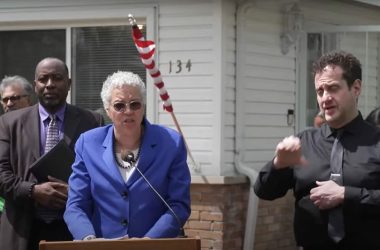Washington, DC–(ENEWSPF)–May 30, 2014.
The Alliance Releases Annual Voting Record Rating Congress
On Thursday, the Alliance released its annual report detailing the voting record of every U.S. Representative and Senator on issues important to current and future retirees. The voting record looks at 10 key votes in both the Senate and the House and assigns a “Pro-Retiree” score for each member of Congress. Scores reflect a member’s level of support for retirees and older Americans.
This year, votes examined include whether to:
· raise the retirement age and fast-track cuts to Social Security;
· privatize Medicare;
· turn Medicaid into a block grant system;
· limit voters’ rights by implementing photo identification requirements; and
· repeal the Affordable Care Act, which would take away some gains for seniors and Medicare beneficiaries in terms of coverage and benefits.
“The first session of the 113th Congress was one of the least productive in modern American history. It enacted just 55 substantive pieces of legislation, the fewest in decades,” said Barbara J. Easterling, President of the Alliance. “The House Speaker said that Congress should be judged on how many laws it repeals. We looked, and it repealed none. It was a year of endless attempts to cut Social Security, Medicare, and Medicaid and repeal health care reform.”
In total, 47 members of the Senate and 154 members of the House received perfect scores of 100 percent. Sixteen Senate members and 132 House members, including House Budget Committee Chairman Paul Ryan (R-WI), received scores of zero. To view the voting record, go to http://tinyurl.com/kxfrped. For the press release, go to http://bit.ly/1oNFvm2.
Early Social Security Claims Linked to Job Demands and Life Expectancy
A new report from the U.S. Government Accountability Office (GAO) suggests that work-related factors and expectations about living past 75 have a powerful impact when it comes to workers claiming Social Security benefits early. The study focuses on those who claim Social Security retirement benefits at age 62, the earliest age of eligibility. The report, available at http://tinyurl.com/na6722x, suggests that workers with physically-demanding blue collar jobs, workers facing unemployment or underemployment, and workers with lower expectations about living past 75 are all among those significantly more likely to claim benefits early.
Workers claiming Social Security at age 62 see their monthly benefits reduced by 25% compared to what they would have received had they delayed claiming until the current full retirement age of 66. Although early claimers see a reduction in monthly benefits, the study also found that these benefits represent a higher proportion of monthly retirement income for these workers when compared to those retiring at 66.
Skyrocketing Median CEO Pay Tops $10 Million
Another new study shows that rapidly increasing executive compensation has resulted in median CEO pay topping $10 million dollars for the first time. Last year was the fourth year in a row in which CEO compensation rose. The typical CEO now makes around 257 times the salary of the average worker, a sharp uptick from 181 times in 2009. The rising pay amounts are in part the result of a booming stock market and a higher proportion of CEO compensation coming through company stock. Not surprisingly, executive compensation rose the highest in the banking industry, with last year’s median pay for Wall Street CEO’s up 22% from 2012.
“CEO’s in this country are raking in increasingly obscene salaries while they are cutting workers’ pensions, and wages for the average worker remain flat,” said Richard Fiesta, Executive Director of the Alliance. “So much wealth going to those at the very top only underscores the importance of protecting programs like Social Security and Medicare and highlights the necessity of the wealthy paying their fair share to ensure a secure retirement for everyone.” More at http://bit.ly/RGnnhB.
Social Security Administration Considering Closing Most Field Offices
The Social Security Administration (SSA) is considering long term plans that could result in the closing of most of the SSA’s more than 1000 community field offices throughout the country. The SSA’s “Vision 2025” plan proposes shuttering field offices and forcing beneficiaries to rely more heavily on internet and phone based services. Such a move would threaten the jobs of nearly 30,000 field office employees and reduce the availability of face-to-face assistance in navigating Social Security benefits. Last year, more than 43 million people sought help through an SSA field office.
“Closing Social Security field offices would particularly harm the millions of seniors without regular internet access and make it more difficult for workers to be sure they are receiving the full benefits they have earned,” said Ruben Burks, Secretary-Treasurer for the Alliance. For more on the proposed closings, go to http://bit.ly/1rl1Yev.
Fiesta Joins Sinema at Tele-Town Hall Call Regarding Seniors and Veterans
On Tuesday, Mr. Fiesta spoke on a tele-town hall call hosted by Rep. Kyrsten Sinema (D-AZ). The town hall focused on current issues impacting Social Security and Medicare on Capitol Hill as well as efforts to address the recent scandal involving wait times and the quality of care at Veterans Administration hospitals nationwide. “There are millions of senior vets across the country. It’s absolutely critical that we do everything we possibly can to make sure all of our veterans enjoy a comfortable, secure retirement and receive the quality health care they deserve,” said Mr. Fiesta.
Voting Restrictions Threaten to Disenfranchise Voters Across South
Republican-backed voting restrictions implemented in the wake of last year’s Supreme Court ruling overturning portions of the Voting Rights Act created problems during recent primary elections in a number of southern states. In states like North Carolina and Arkansas, the new rules led to issues including widespread confusion, absentee ballots being rejected, and some voters being forced to sign affidavits before voting. The laws are currently facing a number of legal challenges, and critics fear that the new restrictions could swing several close elections in November. Read more on the effects of the voter restriction laws at http://on.msnbc.com/TXHlGC.
Source: http://retiredamericans.org








